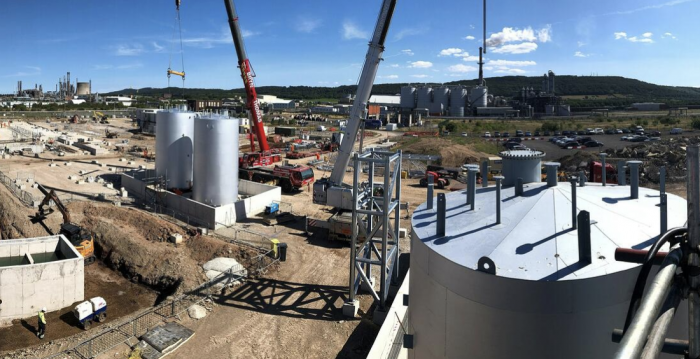Recycling project from igus partner Mura Technology continues to gain momentum

Recovering petroleum from plastic: This is the goal that the British company Mura Technology is pursuing with the HydroPRS process in order to advance the circular economy of plastics. A concern that is also shared by the motion plastics specialist igus. Since 2020, igus has been supporting Mura’s project as an investor. The first HydroPRS plant for the chemical recycling of plastic waste is currently being built by Mura’s subsidiary ReNew ELP in Teesside, England. The recycling pioneer is making great progress and will commission the plant in early 2023.
Construction of the first HydroPRS plant for recycling plastic waste began in April 2021. The process enables the recycling of unsorted plastic waste with a low carbon footprint. HydroPRS is insensitive to organic contaminants such as paper and food residues, making a wide range of plastic waste suitable as feedstock. This is shredded in the company’s own material processing plant and impurities such as glass, stones and metals are removed. ReNew ELP continues to make significant progress in the construction of the plant, although the Corona pandemic and raw material shortages have had an impact on the project, as in other sectors of the economy. After the excavation and civil engineering work, concrete was mainly poured in the last few months to build the foundations and substructures for the buildings and facilities. In July, the first equipment such as storage tanks for distillate were already delivered to the construction site. In addition, some of it is being taken to local warehouses or stored at the suppliers’ premises. This helps with the installation planning, as the equipment is thus available at all times and can be installed efficiently. The next major construction projects are the material preparation plant and the main process plant. In July, Mura already started programming the control software for the HydroPRS plant, which should be completed by October.
Capacities to be further expanded
The goal is to have the ReNew ELP site operational by early 2023. In the first phase, the plant’s capacity is 20,000 tonnes, which will be increased to 80,000 tonnes annually. By comparison, the world’s largest rubbish vortex, the Great Pacific Garbage Patch, which floats in the Pacific Ocean between Hawaii and California, currently consists of about 80,000 tonnes of plastic waste, according to researchers’ estimates. In the future, more HydroPRS facilities are to be built around the world – including in Germany. Several possible sites have already been identified. One of them is currently in the development phase and is expected to go into operation by 2025. The planned plants in Germany have a processing capacity of 50,000 to 100,000 tonnes per site. Mura’s business model includes its own sites in the UK, Europe and the US as well as global licensing opportunities through Mura’s partner KBR. In the meantime, further partners such as DOW Chemical, Chevron Phillips Chemical and Mitsubishi Chemical have joined. igus has also been a partner of Mura since 2020 and has invested 5 million euros in the project.
Together for more sustainability
Mura is already working with suppliers to supply the HydriPRS plant with plastic waste. These collect plastic waste from households and cities and supply it to Mura in the future. But Mura is going one step further and is actively driving the development of this new industry sector by working with policy makers and other stakeholders. To highlight the positive environmental impact of its own HydroPRS plant at Wilton, Mura is also working with independent partner Warwick Manufacturing Group (part of the University of Warwick) on a life cycle assessment of the plant, which is due to be published in autumn 2022. “We know the great possibilities of this ground-breaking technology and are supporting Mura to help chemical recycling make a breakthrough. Together, we want to drive the circular economy of plastics in order to conserve precious resources and raw materials,” says Frank Blase, Managing Director of igus GmbH. For over 50 years, igus has already been regranulating 99 percent of the plastic waste generated in production and has also launched its own recycling programme for end-of-life energy chains in 2019. With the cradle-chain and the iglidur ECO plain bearings, the first products made of up to 100 percent recycled material have also been created this year. Also new: the igus:bike project for sustainable, urban mobility. The concept includes an all-plastic bicycle that is completely lubrication- and rust-free and whose frame and wheels can also be made from post-consumer waste. With the igus:bike platform, igus also wants to promote the know-how around plastics in the global bicycle industry and thus advance the circular economy internationally as well.
For more information, please visit: https://www.igus.de/
News Categories
- » NEWS HOME
- » Automation & Robotics
- » Industry 4.0
- » Material Handling
- » Sensors
- » Quality & Testing
- » Machine Vision
- » Laser & Optics
- » Metalworking
- » Motion Control & Drives
- » Hydraulics & Pneumatics
- » Process Industry
- » Renewable Energy
- » Agriculture
- » Home & Office Furniture
- » Environmental Tech









